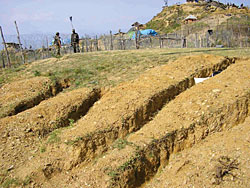 |
"I was heading to my neighbour's place at 7am, to help them build their home, when suddenly I heard gunfire. The police were advancing towards my home, firing gunshots and setting fire to the neighbourhood. Soon our houses went up in flames and people were crying aloud �" Tantaveer Oli of Khara, Rukum, recalls the day with sorrow in his eyes. His entire village was consumed by flames, with 66 houses and farms burned to ashes, and 15 innocents were killed by the police. On 22 February 2000, the village of Khara fell victim to one the worst atrocities committed by government forces in the 10 years of the armed insurgency. Parvati Khatri remembers panicking and going into the jungle, searching for her daughter-in-law. "I told them that my daughter-in-law was innocent and my granddaughter was young. I pleaded with them, but those sinners did not listen. They killed them in front of my eyes."
Ramkali Khadka, a mother of two, had gone to the jungle with her husband Laxmi to cut grass. They were hurrying home after realising their village was on fire. But they were targeted by the police themselves, and Laxmi was shot dead. "I cried and screamed in front of them, but they would not listen," says Ramkali, recalling the day of her loss. "As if that wasn't enough, they set fire to our homes too."
Tantaveer, Parvati and Ramkali are among many in Khara who faced the terror of seeing their houses burnt down and family members killed. "Whenever we see a uniformed person, we instinctively fear for our lives," says Raj Singh Oli.
After a long period of neglect, the government provided aid to the bereaved families of Rs 100,000 each, along with compensation for destroyed property. Some have rebuilt their homes, but many used the money simply to get by. Those who did not receive adequate aid have not even been able to pay for their children's education.
When Prachanda was prime minister, minister of peace Janardan Sharma declared he would make Khara a 'village of peace'. Roads, school buildings, drinking water facilities and toilets were built, and even the police station was reconstructed. Former VDC chairperson Sita Oli claims that the Ministry of Peace and Reconciliation spent a total of Rs 3,500,000 on relief for Khara last year, and Rs 10 million this year.
But the survivors of the Khara massacre would rather have their homes reconstructed than be given communal facilities. Most of all, their hearts still cry for their loved ones. Their loss cannot be erased by development or money. Eleven years have gone by since that day of terror, but the wounds of Khara are still raw.
READ ALSO:
Undiplomatic diplomacy
Driving UNMIN away
Royalists in the Madhes


